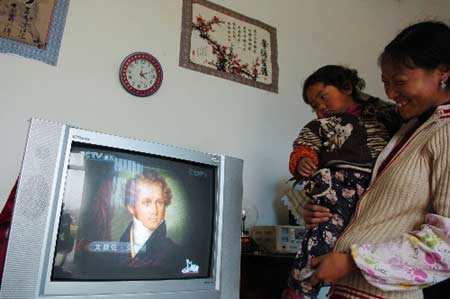China to subsidize farmers for household appliance
Updated: 2007-12-23 10:30
China is promising to give farmers subsidies for purchasing household electric appliances in a bid to stimulate the sluggish rural consumption and reduce the rising trade surplus.
A pilot program will initially be launched in the three major agricultural provinces of Shandong, Henan and Sichuan, where farmers who buy color TV sets, refrigerators and mobile phones can get subsidies worth 13 percent of the prices, the Ministry of Finance (MOF) said Saturday.
A total of 197 types of the three categories, especially produced for the rural markets, would be available from December 2007 through May next year and air conditioners and washing machines would be included in the future, Zeng Xiaoan, an official with the ministry, said.
So far, the government has signed cooperative agreements with 15 household appliance makers, including Haier, Hisense and Changhong, and 21 dealers.
Though consumer spending is playing an increasing role in China's economic growth, investment and export remain much bigger contributors to growth and the country's vast countryside, with a population of 800 million, still has huge market potential.
In China, rural areas lag nearly 20 years behind urban areas in terms of popularity of major home appliance such as TV sets, refrigerators and washing machines, according to official figures.
By 2010, the subsidy program is expected to narrow the gap to 10 years and increase rural consumption by 100 billion yuan (US$13.6 billion) a year, said Zeng. "If one more percent of the rural families buy TV sets priced at 1,000 yuan each, it means 2.5 billion yuan."
The program is essential to expanding the domestic consumption as "raising farmers' income remains difficult and the gap between rural and urban areas is large," he said.
To improve farmers' livelihood and expand rural consumption, China is also spending hundreds of billions of yuan to extend the country's electricity grid to every remote village by 2010.
China, the world's largest producer and exporter of household appliances, sold half of its production abroad every year, said Zeng.
Color TV sets, refrigerators, washing machines, air conditioners and mobile phones combined contributed US$50 billion, or 28 percent, to China's trade surplus in 2006, up 45 percent from a year earlier.
Selling more household appliances to rural families would help China reduce trade surplus and frictions, and ease the problem of overcapacity in many manufacturers, he said.
By 2010, the program would divert 20 percent of the exports to rural markets and reduce trade surplus by US$10 billion annually, he added.
|
|
|
||
|
||
|
|
|
|





